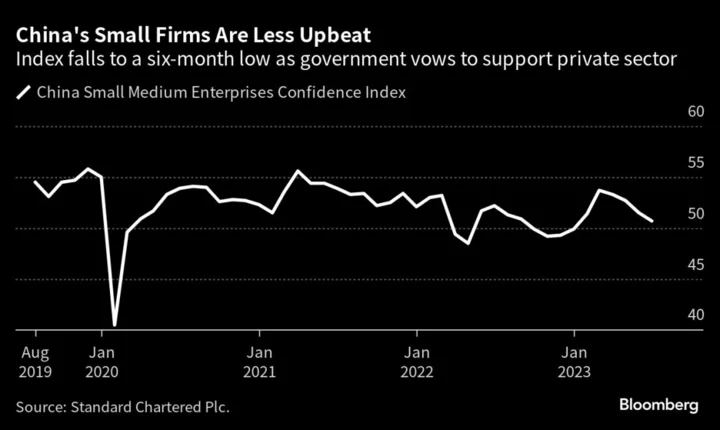China’s economic recovery continued to lose momentum in July, high frequency indicators show, with consumers pulling back on spending and the property market showing no signs of a rebound.
Housing sales in the country’s biggest cities continued to fall, car sales contracted and business sentiment, especially among smaller firms, weakened, the data showed. Heat waves and deadly floods hitting various parts of the nation pose another threat to growth, as they could strain power supply and disrupt logistics and production.
That sets the stage for possibly more gloomy economic news when China releases official July data from next week, starting with the purchasing managers index on Monday. The consensus among economists is that economic growth will now come in closer to the government’s target of around 5% this year, with much depending on the recovery in consumption and the property market.
Beijing has signaled more support for the struggling housing sector, but has stopped short of promising stronger monetary and fiscal stimulus. Without that aid, the economy will probably just “muddle through” the rest of the year, Citigroup Inc. and other banks have said.
Here’s a look at some of the recent high-frequency indicators for July:
Business Confidence
Small and medium-sized companies were the least upbeat about their prospects in six months in July, according to a survey by Standard Chartered Plc.
The bank’s China Small Medium Enterprises Confidence Index eased to 50.7 this month — falling closer to the 50 level that separates expansion from contraction — as new export orders dropped and hiring slowed.
High-Tech Manufacturing
Activity in emerging industries such as green technology, high-end equipment manufacturing, and new energy vehicles shrank this month for the first time since December, according to a poll by China Logistics Information Index (Beijing) Co. and a research institute linked to the Ministry of Science and Technology.
Businesses are being forced to cut output prices despite facing higher input costs, which underscores insufficient demand in many sectors, according to the survey.
That will “erode corporate profits, making it more difficult for firms to reinvest,” Chen Zhi of the research institute said in a statement accompanying the release of the survey results.
The EPMI is a leading indicator for the official manufacturing PMI, according to Goldman Sachs Group Inc.
What Bloomberg Economics Says...
“China’s PMIs for July will probably show the recovery still failing to gain traction. We expect the boost from greater policy support to emerge in coming months, but not in the data due next week. Those will likely signal services expanded at the same pace as in June, with weaknesses in property and goods sales canceling out gains from a brisk summer travel season. Manufacturing will probably shrink for a fourth straight month.”
— Chang Shu and Eric Zhu, economists
For the full report, click here
Car Sales
Passenger vehicle sales declined 4.8% in July from a year earlier, and 8.6% compared with June, according to preliminary estimates by China’s Passenger Car Association. Sales of new energy cars, which the government has been pushing hard this year as a consumption pillar, surged 27.5% on year but fell 6.8% from the previous month, the figures show.
Housing Market
The weekly average of new housing sales by floor space in China’s tier-one cities is on pace to hit its six-month low, according to Bloomberg calculations based on figures in the first 21 days of July provided by China Real Estate Information Corp. Trading in the four metropolitans of Beijing, Shanghai, Guangzhou and Shenzhen is a barometer of the country’s overall property market.
Infrastructure Spending
Local governments have slowed the pace of bond sales used to finance infrastructure projects in July. That suggests infrastructure growth is unlikely to accelerate in the near term.
The issuance of local government special bonds so far this month has been a third less than what was sold in June, according to data compiled by Bloomberg. There’s usually a lag of about a month between the debt sale and the actual investment made, Cinda Securities Co. has previously estimated.
Despite the figures, commodity prices have rallied on the back of Beijing’s promises to provide more support to the real estate sector. Glass futures traded in Zhengzhou is in line to book its fifth straight week of gains while copper has risen more than 5% from a June low on the London Metal Exchange. Iron ores are trading near a nearly four-month high.
--With assistance from Tom Hancock and Alfred Cang.
(Updates with detail on extreme weather, Bloomberg Economics comment.)

